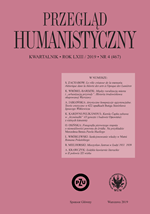Le rôle créateur de la memoria rhétorique dans la théorie des arts à l’époque des Lumières
The Creative Role of Rhetorical Memoria in the Theory of Arts During the Age of Enlightenment
Author(s): Sebastian ZacharowSubject(s): History, Language and Literature Studies, Fine Arts / Performing Arts, Studies of Literature, Theory of Literature
Published by: Wydawnictwa Uniwersytetu Warszawskiego
Keywords: Rhetoric; Theory of art; Diderot; French literature
Summary/Abstract: The article addresses the issue of one of the parts of rhetoric – memory (memoria) in relation to fine arts (beaux-arts), a term invented by Charles Batteux. In the classical understanding of the rhetorical discourse, memoria is a set of rules allowing the speaker to remember his speech and then to deliver it in the best possible way. In terms of aesthetics and art, the mentioned term takes on many new meanings, to the extent that Diderot’s Encyclopedia does not use it at all. In order to explain the role of memory as a creative process, the French theoreticians of the Age of Enlightenment (Batteux, Dubos, Voltaire) use many other terms, which only shows the complexity of the term memoria. The aim of the article is to show the adaptation of the rhetorical term to the area of poetics and theory of art, and to present how this rhetorical concept becomes one of the foundations of the fine arts.
Journal: Przegląd Humanistyczny
- Issue Year: 467/2019
- Issue No: 4
- Page Range: 7-14
- Page Count: 8
- Language: French
- Content File-PDF

